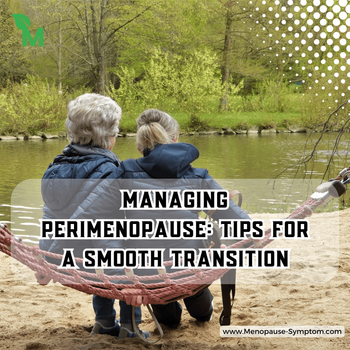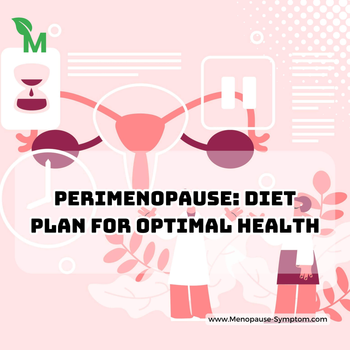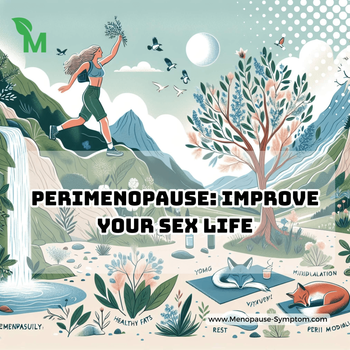Perimenopause: Your Body's Second Puberty
On
07/10/2024Reading time:
10 min
Summary:
Perimenopause, a special time in every woman's life, is often described as a "second puberty." It's not only the beginning of physical changes, but also a wonderful opportunity to rediscover yourself and nurture your health.
From hormonal changes to emotional and psychological changes, perimenopause brings with it many interesting things to explore and understand.
When people think of perimenopause, they often think of discomfort and hardship. However, in reality, it's a time when new opportunities and personal insights can emerge. The body begins to become more sensitive, and symptoms like hot flashes, insomnia, and mood swings can become a part of everyday life. It is through these changes that we can realize the importance of mental and physical health, and this will guide us to make smarter decisions in life.
Perimenopause usually occurs from the age of 40 onwards, but in some women, the signs can appear earlier. One of the important factors that we need to pay attention to is the change in estrogen levels, the key hormone in regulating the menstrual cycle and overall health of women. The drop in estrogen can cause unpleasant symptoms, but it also gives us the opportunity to learn more about our bodies and make positive changes in our lifestyle, from regular exercise to a healthy diet.
There is no denying that perimenopause can increase feelings of discomfort. However, the right approach can help us get through this stage more easily. Taking care of yourself during perimenopause is a challenging but rewarding journey. We can start by learning health and relaxation techniques, such as yoga or meditation, which can help reduce stress and improve mood. This will help you feel more confident and positive during this period.
Exercise is also an essential part of a woman's lifestyle during perimenopause. Research shows that staying physically active not only helps reduce symptoms but also improves cardiovascular health and weight control. You can choose activities what you enjoy such as walking, swimming or even dancing to keep your body healthy. This will help you feel more confident and happier in your daily life.
An indispensable factor in taking care of your health during perimenopause is nutrition. Not only taking care of your body on the outside, taking care of it on the inside is even more important. Having a balanced diet can help regulate the symptoms of perimenopause, while providing the body with the right energy. You can refer to foods rich in calcium such as milk, dairy products, zucchini, or green vegetables to keep bones strong, which is especially important when estrogen begins to decrease. In addition, foods rich in omega-3 such as salmon, chia seeds also help reduce inflammation symptoms and improve mood.
In addition to physical changes, perimenopause also affects psychology and emotions. Some women may experience strong and uncontrollable emotions. Talking to a specialist or joining a support group can help you share, sympathize and get tips, and you will also feel more comfortable when you are socially connected. This is an opportunity to connect with others going through this stage, share experiences and get useful advice.
Perimenopause is not an end, but a transition. It’s a time to re-evaluate what’s really important in your life. You might take up new activities, try a new hobby, or even change careers. This phase can help you discover new dimensions of yourself that you never thought possible before.
Remember that perimenopause is not a negative thing, but an opportunity to grow as a person, discover new things, and experience life in different ways. Studies have shown that many women feel more confident and mature after going through perimenopause. They learn to love themselves more, take better care of themselves, and live more positively.
Don't forget that drinking enough water is also very important during perimenopause. Water helps maintain body moisture, supports digestion, and relieves symptoms such as dry skin or night sweats. Interestingly, drinking enough water regularly can also help you feel more alert and active.
Finally, it is also helpful to record changes in your body and emotions. You can keep a diary to track your symptoms, thereby finding the most effective methods and ways to take care of yourself. This will not only help you better understand what is happening to you, but it will also help you gain a deeper understanding of your perimenopause and be able to share it with others who are going through the same thing.
In short, perimenopause is truly a “second puberty” full of challenges but also full of opportunities. See it as a journey to rediscover and love yourself more. Take care of your mental and physical health, and don’t hesitate to seek support when needed. It is during this period that you will have the opportunity to find yourself again and experience life in a way you never thought possible. Make perimenopause a new chapter in your life journey, one where vitality and joy are always present.
Source: Team MPS compiled, analyzed and wrote. Please dont reup without source. Many thanks.

Managing Perimenopause: Tips For A Smooth Transition
Invalid Date

Perimenopause: Diet Plan For Optimal Health
09.02.2024
Perimenopause is the time when the body begins the natural transition to menopause, marking the end of a woman's reproductive years, usually starting at age 40.

Perimenopause: Improve Your Sex Life
09.02.2024
Perimenopause is a natural stage in a woman's life, usually starting at the age of 40. Perimenopause is a stage where a woman's body experiences many psychological and physiological changes, as well as health problems before entering menopause.
